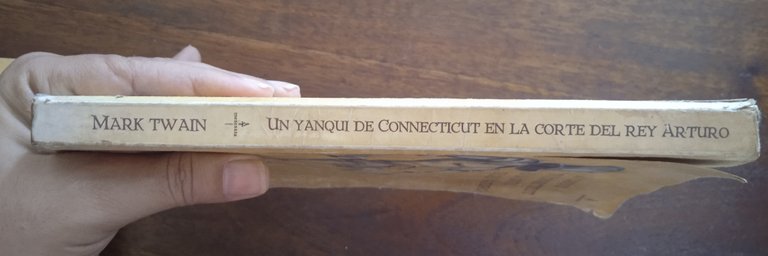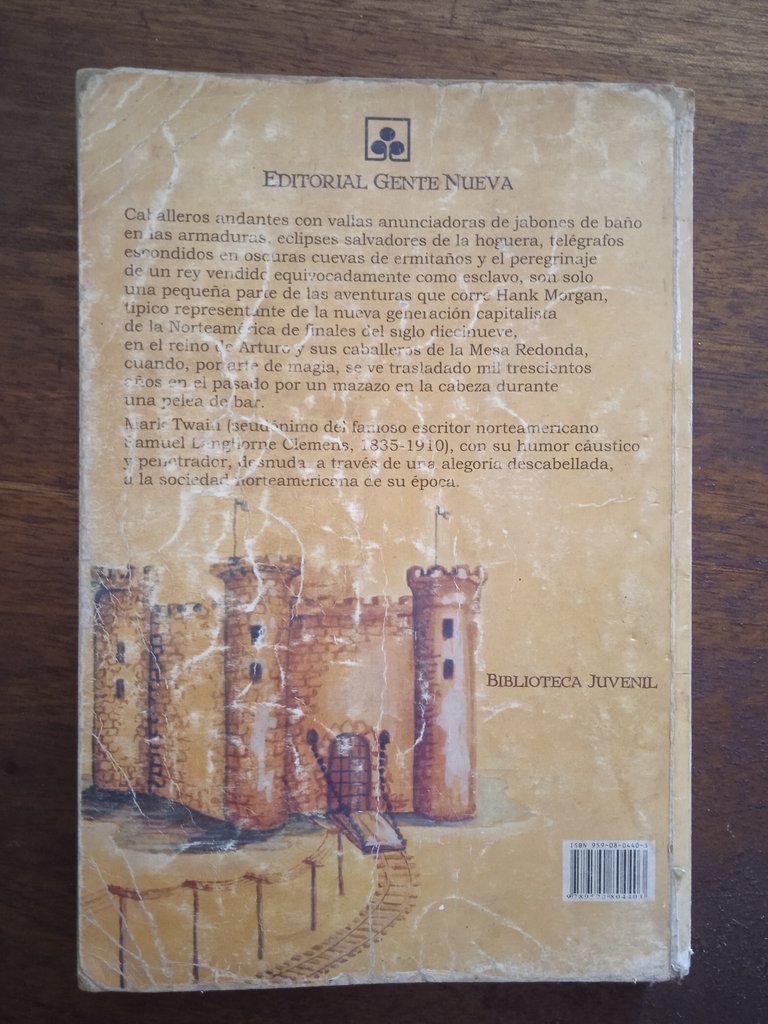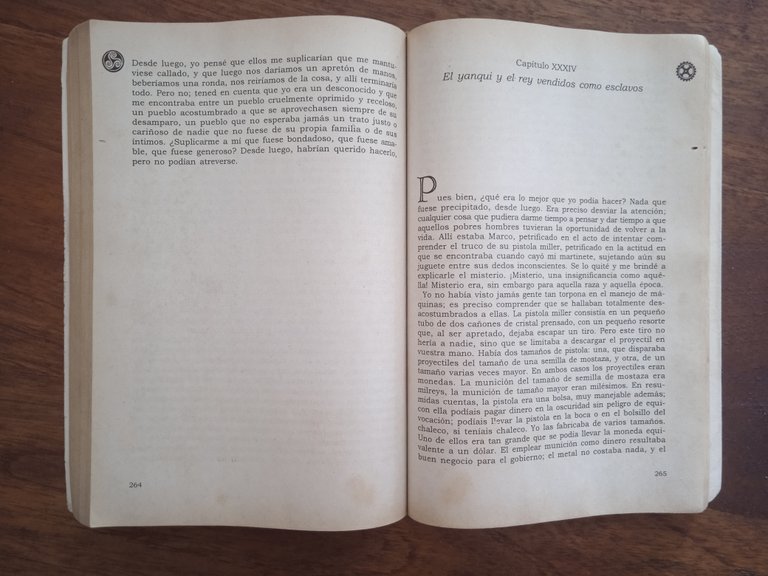Un yanqui de Connecticut en la corte del Rey Arturo. A primera vista parece una elección improbable, ya que Mark Twain tiene libros infinitamente más conocidos, pero quiero contarles por qué la disfruto tanto.Hola #HiveBookClub, regreso a esta comunidad con un libro que nunca está lejos de mi vida diaria:
Samuel Langhorne Clemens es un nombre poco conocido, pero bajo su nombre de pluma, Mark Twain, publicó algunas de las novelas más influyentes de la literatura norteamericana. Sin embargo, la que hoy nos ocupa merece en mi opinión similar reconocimiento que las demás aunque sufra de males muy propios.

Esta edición paperback muestra los claros signos de muchas relecturas.
Contrario a sus trabajos mas conocidos, Mark Twain escogió en esta ocasión un argumento un poco más alejado de su realidad inmediata. Hank Morgan, ingeniero de Connecticut, recibe un golpe a la cabeza y de alguna forma termina transportado a la Inglaterra del Rey Arturo, donde deberá hacer uso de su inteligencia y educación para sobrevivir, adaptarse y luego transformar su nuevo entorno.
Esta novela es profundamente sarcástica como otros títulos más conocidos del mismo autor, pero con tintes algo diferentes, más políticos y sociales, pues el punto de ataque no son las costumbres y supersticiones populares, sino las instituciones políticas y religiosas del medioevo inglés.

Esta novela fue una gran favorita de mis primos y yo.
Los nobles son retratados como ignorantes, supersticiosos y crédulos; la monarquía como un total sinsentido, inhumana y retrógrada. La religión organizada recibe también una generosa ración del más agudo sarcasmo, lo cual, dicho de una obra de Mark Twain es decir ya algo.
Todos aquellos aspectos del medioevo romantizados hasta la saciedad, como el amor galante y los caballeros andantes reciben dosis letales de burla, a tal punto que luego de leer El Quijote y este libro, nunca pude leer ningún libro de caballerías.
Se trata, en suma, de una gran sátira que revela el humor cáustico de su autor, esa mirada corrosiva que desnuda de apariencias y reduce las pretensiones al más puro ridículo. Esa burla tenaz que supera las superficialidades para herir allí donde las narrativas tienden a idealizar "los buenos viejos tiempos", esa es el arma blanca con que el autor destruye falsedades antiguas y actuales.

Es todo un milagro que luego de pasar por tantas manos siga en una pieza.
Sin embargo, por mucho que disfruto el libro, sería injusto no mencionar los que me parecen sus problemas fundamentales. En primer lugar, algunos pasajes evidencian miradas racistas o machistas que eran perfectamente normales en la sociedad estadounidense del siglo diecinueve, pero que hoy en día pueden irritar bastante al lector no dispuesto a entender el contexto general del autor.
Una cierta actitud de superioridad y condescendencia proveniente del protagonista puede llegar a resultar bastante incómoda, aunque es necesario reconocer en cierta medida que sin esa posición hubiera sido muy difícil construir una burla tan efectiva.
El final me pareció excesivamente oscuro y abrupto, casi como si se tratara del esbozo de un trabajo inconcluso y no una obra pulida a conciencia. Estas cuestiones no le restan mérito a la obra, que releí en varias ocasiones, y es que el exquisito don del sarcasmo que exhibe el autor nunca pierde su filo cortante.

Las polillas hicieron acto de presencia pero las detecté a tiempo y pude evitar males mayores.
Al principio dije que este libro nunca está lejos de mi vida diaria, y para explicarlo me remito al hecho que inspiró al autor. Supuestamente Mark Twain tuvo un sueño en el cual se vio a sí mismo como un caballero entorpecido por el peso de su armadura, luego de lo cual dió a luz su obra burlesca y provocativa.
Creo como aparentemente creía él (a juzgar por la lista de sus escritos) que lo que no resista el peso de la crítica, el humor y la sátira, carece de valor. Las personas que carecen de la capacidad de burlarse de sí mismos y reír ante los errores propios, esos demasiado satisfechos de su importancia y seriedad me han parecido siempre seres de los cuales cuidarme, aunque pueda yo estar equivocado: no soy juez de nadie.
Nada derrumba tan rápido las apariencias vacías como el humor "de buena puntería", nada revela nuestra humanidad o carencia de ella como la capacidad para reír de nuestras propias mezquindades. Siempre me ha parecido que los grandes humoristas dijero sus mejores líneas cuando estaban parados frente al espejo, literal o metafórico. Por eso respeto tanto la flexibilidad mental necesaria para la autodeprecación: cualquier motivo es bueno para la risa y la vida requiere de una sólida armadura forjada en este material invencible y puro.
A Connecticut Yankee in King Arthur’s Court. At first glance, it might seem like an unlikely choice since Mark Twain has infinitely more famous works, but let me tell you why I love this one so much.Hello, #HiveBookClub! I’m back in this community with a book that’s never far from my daily life:
Samuel Langhorne Clemens is a name few recognize, but under his pen name, Mark Twain, he wrote some of the most influential novels in American literature. Yet the book we’re discussing today deserves, in my opinion, just as much recognition as the others, even if it suffers from its own unique flaws.

This paperback edition shows clear signs of many rereadings.
Unlike his better-known works, Twain chose a premise a bit further removed from his immediate reality this time. Hank Morgan, an engineer from Connecticut, gets knocked on the head and somehow ends up transported to King Arthur’s England, where he must use his intelligence and education to survive, adapt, and eventually reshape his new surroundings.
This novel is deeply sarcastic, like Twain’s more famous titles, but with a different edge, more political and social. His target isn’t popular customs and superstitions but the political and religious institutions of medieval England.

This novel was a big favorite of mine and my cousins.
The nobility are portrayed as ignorant, superstitious, and gullible; the monarchy as utterly nonsensical, inhumane, and backward. Organized religion also gets a generous serving of sharp sarcasm, which, coming from Mark Twain, says a lot.
All those romanticized aspects of the Middle Ages, chivalric love, knight-errantry, are mercilessly mocked to the point where, after reading Don Quixote and this book, I could never take knightly tales seriously again.
In short, it’s a brilliant satire that showcases Twain’s caustic humor, his corrosive gaze that strips away pretenses and reduces grand illusions to pure absurdity. That relentless mockery, which goes beyond surface-level jabs to skewer the idealized narratives of "the good old days," is the razor-sharp blade Twain uses to dismantle ancient and modern falsehoods.

It’s a miracle that after passing through so many hands, it’s still in one piece.
That said, as much as I love this book, it would be unfair not to mention its fundamental flaws. First, some passages reflect racist or sexist views that were perfectly normal in 19th-century American society but may irritate modern readers unwilling to contextualize the author’s era.
The protagonist’s attitude of superiority and condescension can also get grating, though it’s worth acknowledging that without this perspective, the satire wouldn’t have been as effective.
The ending struck me as excessively dark and abrupt, almost like a rough draft rather than a polished work. These issues don’t diminish the book’s merits, though. I’ve reread it multiple times because Twain’s exquisite gift for sarcasm never loses its edge.

The moths made an appearance, but I caught them in time and avoided major damage.
Earlier, I said this book is never far from my daily life. To explain why, I’ll go back to what supposedly inspired Twain: a dream where he saw himself as a knight hobbled by the weight of his armor, which later gave birth to this provocative, mocking tale.
Like Twain (judging by his writings), I believe that anything that can’t withstand criticism, humor, and satire is worthless. People who lack the ability to laugh at themselves, those too satisfied with their own importance and seriousness, have always struck me as individuals to be wary of. Though I could be wrong, I’m no one’s judge.
Nothing dismantles empty pretenses faster than "well-aimed" humor. Nothing reveals our humanity or lack thereof like the ability to laugh at our own pettiness. I’ve always felt the greatest humorists delivered their best lines while standing in front of a mirror, literal or metaphorical. That’s why I respect the mental flexibility required for self-deprecation: any reason is good for laughter, and life demands armor forged from this pure, invincible material.
Este post es libre de IA.
📷 de mi propiedad.
This post is free of AI.
📷 are of my property.
I also find it hard to get close to someone who can't laugh at themselves. It always feels like I might say something that could upset them. A bit of self-effacing humor puts others at ease and makes us more approachable.
This book must have a lot to offer. Thanks for sharing.
Have a lovely weekend!
Indeed, those who can not take on laughter usually can not take on life. Humour helps lighten the pressure and not just the mood, it just helps us cope with stuff that otherwise would be just doom and gloom.
¡Brillante reseña de una obra maestra que todos debemos leer!
¡Estoy seguro que, quienes no lo han leído, ahora motivados por tus palabras lo harán!
¡Bravo!
Gracias por tus palabras. Es una obra que me gusta mucho, si con mi reseña puedo hacer que alguien se interese en ella me doy por satisfecho.
¡Pues será así seguramente!
Gracias a ti por llegarte a leer, es siempre un placer cuando una reseña es bien recibida.
¡Por supuesto!
¡Gracias a ti!
Gracias por tan interesante reseña. Un abrazo fuerte
Me alegra que te haya resultado interesante. El libro no está exento de problemas pero aún así creo que está largamente infravalorado. Gracias por tus palabras.
Thank you for an interesting review! I am often stunned by certain people in the academics who dared to openly criticize the monarchy. Again, I find their honesty refreshing but maybe a tiny bit too daring for their own safety.
Russian writers from the tsarist era often found the monarchs don't take lightly to such open criticism and mockery, but Twain's issue was different, as an American he probably shared the overly negative view that was common in the USA about the English monarchy.
I have even wondered if there aren't some political subtexts to this novel, maybe there are, guess someone with a better knowledge of the author's society could point them out.
Thank you for stopping by my blog and for your words.
Muy disfrutable reseña. Tuve Cyrano de Bergerac y lo cambié a un amigo por "Un yanqui..." Nunca me arrepentí. Es una gran parodia llena de contrastes debido al protagonista temponauta, jjj. Gracias por el buen recuerdo.
Gracias a ti por tus palabras. Si bien otras obras de Mark Twain recibieron y reciben mucha más atención, siempre me pareció que esta era mucho más obscura y menos conocida y sin embargo disfruté tanto el leerla que de cierta forma me pareció siempre una injusticia.
Muchas gracias por su apoyo, siempre viene bien y es de gran ayuda.
Congratulations @cumanauta! You have completed the following achievement on the Hive blockchain And have been rewarded with New badge(s)
Your next target is to reach 600 replies.
You can view your badges on your board and compare yourself to others in the Ranking
If you no longer want to receive notifications, reply to this comment with the word
STOP